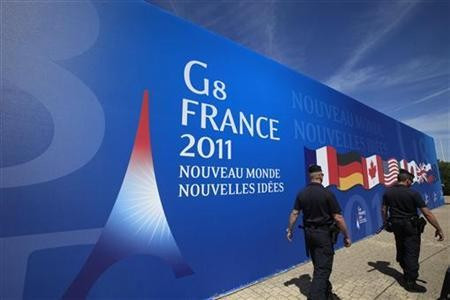G8 countries pledge £12 billion to Egypt and Tunisia, dangle ceasefire in front of Gaddafi

G8 countries have today come up with a £12 billion pledge in aid, loans and debt relief in an attempt to support and enhance pro-democratic regimes in North Africa. While the full details of the package are yet unknown, the money will come from international financial institutions as well as members of the G8.
Both the leaders of Egypt and Tunisia are attending the summit and are due to make speeches. They are expected emphasis their need for money, while also stressing that as both countries are still facing severe economic problems, ranging from decreasing economic growth, high inflation, high youth unemployment and loss of tourism. Tunisia has been especially affected by the continuing conflict in neighbouring Libya, thanks to large refugee flows.
The aid package however will not come without strings attached as further steps to democracy will be one of the main conditions. The overthrow of Mubarak and Ben Ali ended an era in both countries but also marked the beginning of what is expected to be a long and chaotic transition. With widespread corruption and failing institutions in both countries the future for btoh countries remains far from certain.
In Tunisia, the electoral commission has already caused fear that the transitional government is not in full control, after it insists elections are deferred from the summer to October to allow more time to prepare a workable electoral roll, despite the government's refusal to accept this.
In Egypt, after the revolution, Field Marshal Hussein Tantawi took power and set up his military council. However, many Egyptians are disappointed with what they see as yet another attempt by the army to dominate the transition process. Many groups set up during the February protests are now calling for a second d"Day of Rage" in Cairo on Friday.
The pledge of G8 countries will certainly come as good news for Egypt and Libya, however figures will have to be examined carefully to see how much represents grants as opposed to loans. In the past G8 countries have been criticised by many international Non-Governmental Organisations for not respecting their pledge and being unable to meet the commitments they had made.
However, the bulk of the money attributed to both countries is in fact expected to come from the International Monetary Fund, the World Bank, the US and the EU. Additionally, both the UK and France have offered bilateral sums. France has promised Egypt up to $250m a year in development aid and on Thursday and British Prime Minister David Cameron also announced he will set aside more than £110m over a period of four years.
While Egypt will no doubt be pleased with France and Britain's help, Mr Cameron and Mr Sarkozy's decision might prove a little more controversial with their people, as it comes at a time where both countries are still struggling to get out of the global economic crisis and have announced major cuts in the public sector.
Cameron, defending his decision to support pro-democracy movements in the Middle East said: "We're demonstrating that there is a chance for people in North Africa to choose their own future and their own freedom rather than having to put up with appalling dictators like Gaddafi."
While the western decision to support the post revolution movement in Egypt and Tunisia did not come as a surprise, the summit nonetheless had some tensions, with Britain and France stepping up attacks on Libya with ground attack helicopters despite Russian concerns that attacking the regime goes well beyond the parameters set out by the original UN resolution which only stipulated the protection of civilians.
In a attempt to turn the situation in favour of the rebel movement and break a months long stalemate Britain will send as many as eight Apache helicopters.
Meanwhile Sarkozy is rumoured to have tried to persuade the US to deploy A-10 attack aircraft and AC-130 gunships in Libya.
In view of the increasingly divided opinion over the legitimacy and legality of the Nato-led operation it has been announced that the G8 will draft a declaration urging Muammar Gaddafi to declare a ceasefire and agree to a political solution instead.
© Copyright IBTimes 2025. All rights reserved.





















